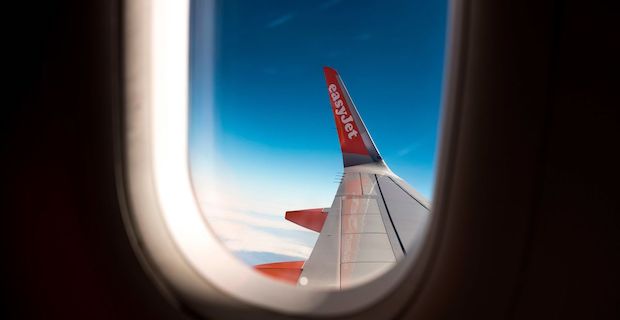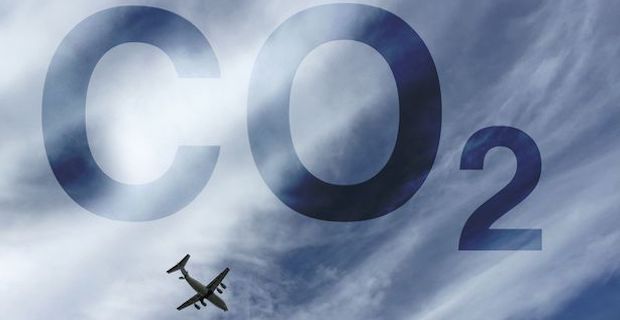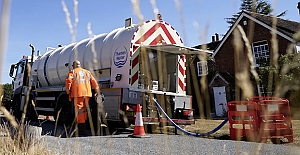A report suggests that by 2020 its emissions per passenger kilometre will be less than half that of some rivals.
The firm's performance is partly down to its modern, efficient fleet and its push to fill every seat.
Companies named as having the weakest plans to cut emissions are Air China; China Southern; Korean Air; Singapore Airlines and Turkish Airlines.
EasyJet's aircraft are expected to be emitting 75g of CO2 per passenger km by 2020, compared with 172g for Korean Air.
International Airlines Group (IAG), which includes British Airways, is expected to emit 112g.
The industry has volunteered to freeze its overall emissions by 2020, and halve emissions by 2050.
This is a more generous target than those given to other industrial sectors, but the report says only EasyJet is meeting those aviation targets so far.

Who produced the report?
The report from the London School of Economics is backed by a group of institutional investors, the Environment Agency Pension Fund.
It is anxious for their funds to support firms committed to reducing emissions.
Faith Ward from the fund said: "Investors have a clear message to the aviation sector: when it comes to carbon performance, they must be in it for the long haul.
"That means setting stretching emissions reduction targets to 2030 and beyond. It's clear this is not currently the case."
The investors also complain that the airlines are trying to achieve their targets using the controversial process of offsetting – where firms plants trees to compensate for their own CO2 emissions.
"Offsetting is no substitute for a clear strategy to reduce emissions," Ms Ward said.
What's the reaction of the airlines?
Aviation creates 12% of transport-related emissions.
The industry body ICAO (International Civil Aviation Organization) told BBC News it couldn't comment on individual airlines, but said the industry's carbon-cutting plans were "on track".
Aviation has been given easier targets than other industrial sectors because although aircraft are becoming more efficient, this trend has been overwhelmed the by the relentless increase in people wanting to fly.
Some caveats must be applied to the LSE research. First, it doesn’t take into account that some airlines allow much more baggage than others, which alter the notional weight per passenger and thus their CO2 tally.
There is also some cause for caution over EasyJet's carbon virtue. Remember that the figures are based on CO2 per passenger kilometre.
This means EasyJet can improve its per capita performance by stuffing planes with cut-price ticket-holders, thereby potentially encouraging a new generation of frequent flyers.
BBC News


 After Nesil Caliskan a by-election will be held in Jubilee ward in Enfield
After Nesil Caliskan a by-election will be held in Jubilee ward in Enfield Publishing the analysis, Labour’s Cllr Ergin Erbil said Everybody in Enfield deserves basic rights
Publishing the analysis, Labour’s Cllr Ergin Erbil said Everybody in Enfield deserves basic rights Gaza-Israel conflict Statement from Cllr Ergin Erbil, Leader of Enfield Council
Gaza-Israel conflict Statement from Cllr Ergin Erbil, Leader of Enfield Council Cllr Ergin Erbil was elected as the new Leader of Enfield Council
Cllr Ergin Erbil was elected as the new Leader of Enfield Council The European Union called on Turkey to uphold democratic values
The European Union called on Turkey to uphold democratic values Turkish citizens in London said Rights, Law, Justice
Turkish citizens in London said Rights, Law, Justice The Council of Turkish Cypriot Associations Geneva response letter
The Council of Turkish Cypriot Associations Geneva response letter Sustainable Development and ESG, Will This Become the Course for Turkic World
Sustainable Development and ESG, Will This Become the Course for Turkic World Saran Media And Euroleague Basketball Extend Media Rights Partnership for Four More Years
Saran Media And Euroleague Basketball Extend Media Rights Partnership for Four More Years Will Rangers be Jose Mourinho’s next victim?
Will Rangers be Jose Mourinho’s next victim? Jose Mourinho's Fenerbahce face Rangers on Thursday
Jose Mourinho's Fenerbahce face Rangers on Thursday Inzaghi stated that they felt the absence of our national player Hakan Çalhanoğlu
Inzaghi stated that they felt the absence of our national player Hakan Çalhanoğlu Barclays has become the biggest UK lender so far to cut mortgage rates
Barclays has become the biggest UK lender so far to cut mortgage rates THE SPRING STATEMENT EXPLAINED, UK ECONOMIC OUTLOOK AND GROWTH FORECASTS
THE SPRING STATEMENT EXPLAINED, UK ECONOMIC OUTLOOK AND GROWTH FORECASTS Launch of Made in Enfield gift shop to celebrate local artists and designers
Launch of Made in Enfield gift shop to celebrate local artists and designers Trial used smart Wi-Fi sensors for live building occupancy data to optimise
Trial used smart Wi-Fi sensors for live building occupancy data to optimise
















